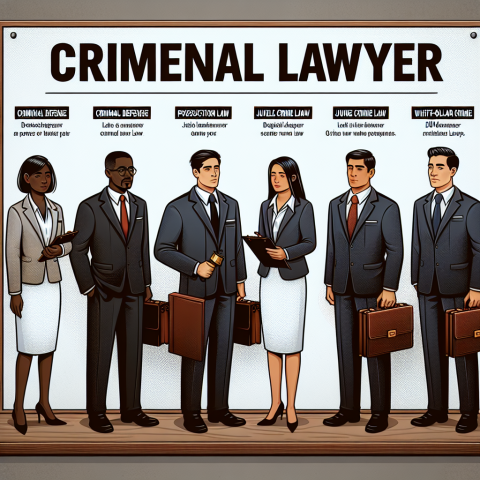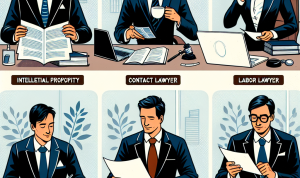Criminal Lawyers – Alright, let’s dive into something that’s probably not the first thing that comes to mind when you think about lawyers—criminal lawyers. But hey, whether you’re in a sticky situation or just trying to understand the different types of criminal lawyers out there, it’s important to know what they do. Criminal law is a huge field, and there are various specializations within it, each focusing on different types of cases.
When I first started learning about criminal law (mainly from watching a ton of crime dramas, let’s be honest), I had no clue there were so many different kinds of criminal lawyers. Turns out, the right lawyer can make a huge difference in how a case goes. So, let’s break it down and talk about the five key types of criminal lawyers and what they do.

5 Key Types of Criminal Lawyers and What They Do
1. Defense Attorneys: The First Line of Defense
Let’s start with the one you’ve probably heard the most about—defense attorneys. They’re probably the most well-known type of criminal lawyer, mainly because they’re the ones who defend the accused in criminal cases. And yes, I’m sure you’ve seen enough movies to know how vital they are. When you get charged with a crime, having a strong defense attorney is critical.
I remember a friend of mine who was facing a DUI charge. He was totally stressed out, thinking his life was over. But after hiring a great defense attorney, they were able to get the charges reduced. The defense lawyer worked hard to gather evidence, questioned the police procedures, and eventually found a loophole that made a significant difference.
A criminal defense lawyer’s job is to fight for the rights of the defendant, challenge the prosecution’s case, and ensure that the defendant’s rights are upheld throughout the process. They might even be able to get the charges dismissed altogether if there’s no solid case or if they can show that your rights were violated during the arrest or investigation.
Pro tip: If you’re ever in a situation where you need a defense lawyer, make sure they have experience in the specific area of law related to your case (e.g., DUI, theft, assault, etc.).
2. Prosecutors: The Lawyers Who Go After the Defendant
If defense attorneys are the ones defending, prosecutors are the ones going after the defendant. They’re responsible for bringing charges against the accused and proving their guilt.
I was once reading about a high-profile case where the prosecutor was relentless. They had a mountain of evidence and witnesses lined up to prove that the defendant was guilty of a serious crime. It was intense to see how hard the prosecutor worked to make sure justice was served.
A prosecutor’s job is to present the case against the defendant in court. They’re often government-employed, working on behalf of the state or federal government. In some cases, the prosecutor might offer plea deals to defendants, which is a negotiation where the defendant pleads guilty to a lesser charge in exchange for a lighter sentence.
Pro tip: Not all prosecutors are created equal, so if you’re a victim or if you know someone who’s involved in a criminal case, make sure the prosecutor assigned to the case is experienced and trustworthy.
3. Public Defenders: Defending Those Who Can’t Afford a Lawyer
Now, this one’s a bit of a mixed bag, but public defenders are crucial in the justice system. Public defenders are criminal defense attorneys who represent defendants who can’t afford to hire a private attorney. The government assigns them to cases, and they’re usually overworked due to the sheer volume of cases they handle.
I once had a cousin who couldn’t afford a private attorney after getting arrested. He was assigned a public defender, and while it was clear that the public defender had a lot of cases on their plate, they still managed to work out a plea deal that saved him from going to jail. Public defenders don’t always get the best reputation because of how many clients they have, but in many cases, they do a lot with the limited time and resources they have.
While you might not get the personalized attention of a private attorney, public defenders are often passionate about their jobs and still work hard to defend their clients.
Pro tip: If you’re assigned a public defender, don’t hesitate to communicate openly with them. They may be busy, but you can still work together to ensure your case is handled properly.
4. White-Collar Crime Lawyers: For the Big Business Crimes
If you’re dealing with a complex financial crime or a case involving embezzlement, insider trading, or fraud, you’re probably going to need a white-collar crime lawyer. These lawyers specialize in crimes that typically don’t involve physical violence, but rather, financial wrongdoing.
White-collar crimes are often committed by individuals in positions of power or authority—think CEOs, bankers, or accountants. I once read about a case where a corporate executive was charged with insider trading, and it was clear from the get-go that the case would require a lawyer who understood the financial world inside and out. White-collar crime lawyers have the expertise to navigate these cases and often work with financial experts to build a strong case for their clients.
Pro tip: White-collar crimes can be tricky, and they often involve complicated financial records. If you’re dealing with one of these types of cases, you’ll need a lawyer with specialized knowledge.
5. Juvenile Defense Lawyers: Defending Minors in the Legal System
Lastly, let’s talk about juvenile defense lawyers. These lawyers focus on defending minors who have been charged with criminal offenses. Juvenile defense law is a bit different from adult criminal law, as the goal is often rehabilitation rather than punishment.
I remember watching a documentary about a teenager charged with theft, and it was heartbreaking to see how the juvenile court system handled it. Luckily, the kid’s defense attorney helped him avoid serious jail time and instead put him into a rehabilitation program. Juvenile defense lawyers work with kids and teens, advocating for them in a way that takes their age and developmental stage into account.
These lawyers help guide minors through the court system, aiming for outcomes that will help them turn their lives around rather than ruin their futures.
Pro tip: Juvenile defense lawyers often have a unique understanding of child psychology and are skilled in helping young people navigate the legal system.
Final Thoughts
Criminal law is incredibly nuanced, and depending on the type of charge, the lawyer you need can vary drastically. Each of the five types of criminal lawyers mentioned here has a distinct role, and if you ever find yourself involved in a criminal case (or someone you care about does), it’s important to choose the right lawyer for the situation. Whether you’re facing serious charges or just want to understand the legal process, having the right criminal lawyer can make a world of difference.



